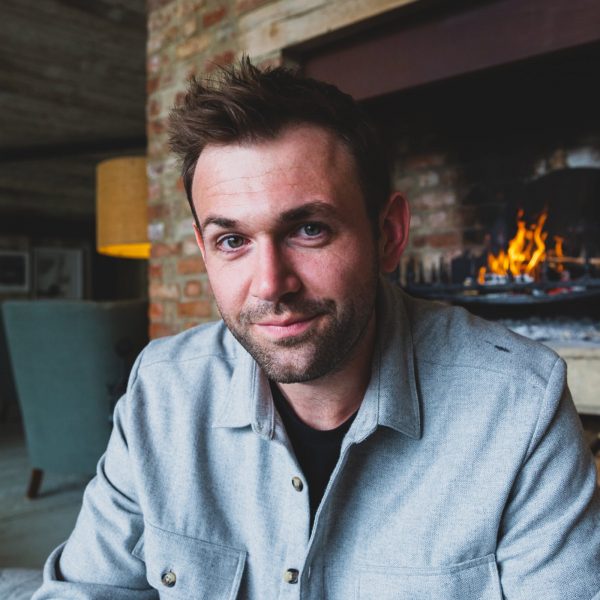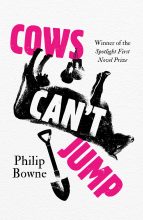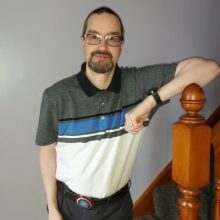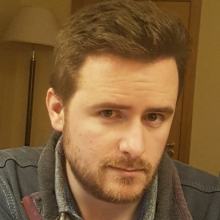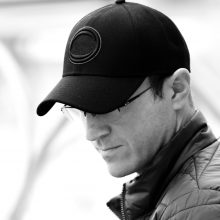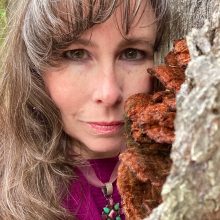Cows Can’t Jump by Philip Bowne
What led you into writing?
As a child I loved to read and write. My mum and older sister probably encouraged my love of books. From an early age, I remember visiting the library and reading with them. I always enjoyed writing stories at school, too. As a teenager I loved writing and experimenting with different voices. I had a blog that I would use just to write all kinds of nonsense. It was a place to practise. I got lots of encouragement from a few readers, which really spurred me on and made me think, “is this something I can actually do?”
At 18, I decided to study English Literature and Creative Writing at University. At first, I really struggled with the writing side of the course. I hated everything I wrote. I hated submitting what I had written into the weekly workshops and having other people read it. I found it unbearable. I guess there was a feeling of pressure. I felt like I wasn’t good enough. I wanted to drop the Creative Writing side of the course and continue with just English Literature. But I had fantastic Creative Writing tutors, and one of them, Mike, talked me into sticking with the course. I am glad he did. I grew in confidence over my second and third years. I published my first short story at 19 and I was totally hooked. I knew I wanted to write a novel and get it out into the world. Mike continued to support me after I graduated, reading my drafts of Cows Can’t Jump and helping me continue to improve. I now consider Mike to be one of my dearest friends and certainly one of the biggest factors when I think about what – or who – led me into writing.
How does a typical day look?
Every day is different. Usually I’d cycle from my flat near Paddington across Hyde Park and into Chelsea, where I’ll spend the day writing with The Wombles. That’s my day job. But I often work from home.
When I was writing Cows, I was working nights at a bar near London Bridge. I’d wake up at midday and write until 4 or 5pm, then head into work for 7pm and get home at 4 or 5am. I wouldn’t recommend that writing routine!
I try and write consistently – 600 words a day is my daily target if I’m working on other things as well. It’s important for me to keep the words ticking over, even if I’m not sure where the story is going! This means I often sit at my computer until quite late, which is probably terrible for my health.
In what ways do your characters test your abilities?
I don’t work in a logical way. I don’t really plot a story. I focus on characters and I just let the ideas come as I write. At least I didn’t when I wrote Cows Can’t Jump – if I ever do another one I’ll try and go into it with a bit more of a plan!
I liked not having a rigid plot because it allowed for moments in the text to occur that wouldn’t have if I’d tried to stay fixed to a set plan. I hate planning. It makes me feel anxious. However, not planning means I end up with an awful lot of editing to do because my characters change and develop in different ways that could contradict what I’ve written earlier in the draft. It’s a nightmare, but I’ve tried creating characters before writing and they end up as one-dimensional mannequins. I have to get inside a story before I know what’s actually going to happen or how any of my characters are going to behave.
What’s your setup?
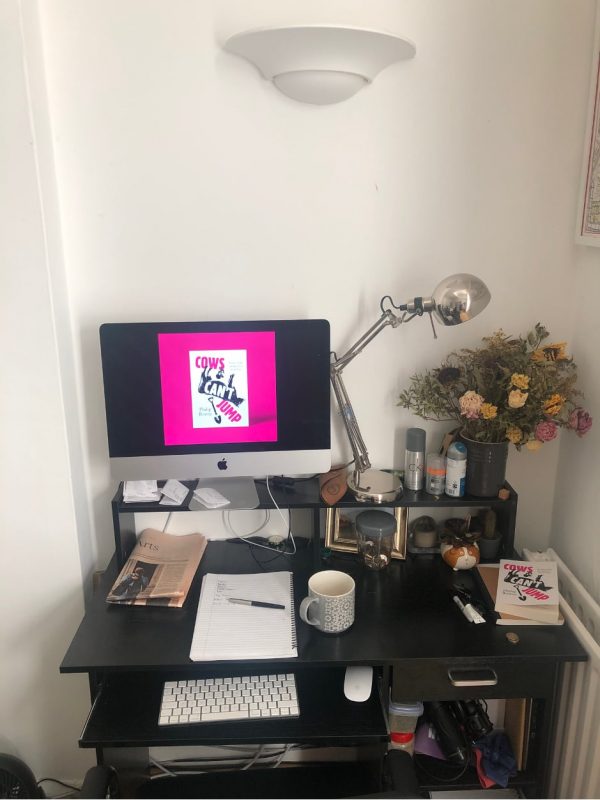
A desk shoved in the corner of the room. Usually crammed with a collection of mugs and glasses, dried flowers and… Cod Liver Oil Tablets?
What lasting effects have your favourite authors had on your writing and style?
Willy Vlautin is one of my favourites. His style is wonderfully lean. He doesn’t mess around with overcomplicated words to try and sound clever – his books are all about simply telling stories. They focus on the emotional depth of characters. I remember listening to Willy speak on a podcast and he said he wanted his books to be something you could pick up on your lunch break and get lost in for 20 minutes. I love that.
I think there’s a tendency to try and overcomplicate things – especially when starting out in writing. But reading Vlautin’s books taught me that using a long word or a semi-colon doesn’t make you a good writer. Creating characters that people can root for is the most important thing for me. So that’s what I try to do.
What do you do for inspiration?
Read, watch a good TV show. Watch YouTube videos of people doing the things I want to write about. I try and ‘free write’ regularly – just writing without thinking about it too much. I set a 20 minute timer and just go for it. Often that’s enough to come up with a good idea. Sometimes it isn’t. But it frees me up and gets words down on the page. It’s so easy to sit in front of a blank page and worry about the writing. Is the story OK? What would this character do? Oh I should delete that… That’s what holds me back the most, I think. Overthinking.
Walking helps. I try and walk as much as possible. I don’t go out for a walk planning on finding inspiration – it’s just a good way to clear your head and allow thought processes to flow. And it’s good to move when you spend all day sitting down.
What repeating themes do you find yourself pulling into your stories?
Work. I’ve worked lots of different jobs – from gardening, bar work, pizza chef, shop assistant. I love reading about work in fiction. I think it’s because I love specific details, and when you’ve worked jobs – particularly mundane or physical jobs with lots of repetition – you can learn a lot about a character and use their work as a set-piece to build themes around. Also, you learn so much about a person from how they behave at work. I think it’s the same for fictional characters.
I often come back to the theme of place or displacement. Dislocating characters from their place in society/family/country/town/anything! Taking a character out of their comfort zone and dropping them in the last place they’d want to be.
In Cows that comes through in the explorations of borders and barriers between people – the lines we blur and cross. Free movement. I’ve grown up through the anti-EU, anti-immigration discourse and come out on the other side as a young adult who is totally baffled by it all. So that tends to surface in my writing.
I like to have fun with my characters. I like to try and create moments that are loaded with conflict and tension, that are also inherently silly. For instance, in Cows, the protagonist Billy ends up having a boxing match with his dad in their garage at home. It was one of my favourite scenes to write.
How do you wind down?
I love going to the theatre, live music, live sport, comedy. Of course, that’s not been possible for a long time. I like to walk around. I love to cook, play piano and watch the mighty West Ham.
What sort of challenges do you regularly overcome while designing your world/setting?
CCJ is set in Cheltenham, which I know well. But the midsection of the novel transports Billy across the European continent. There are places I have been that feature on Billy’s journey (Lucerne, Bled), but there are just as many places that I’ve never been to. This involves a painful amount of Googling. But writing about places you do know can be just as challenging. Sometimes you need a little artistic license to change a few details but there’s a niggling voice inside your head that’s saying, “That’s not right, you’re making that up! You’re lying!” Then you start worrying that people who also know that place might call you out on it, or that maybe it ruined the whole book for them. Can you see how neurotic I am? I’m talking about the most minute of details here, like which end of Cheltenham High Street the WH Smith’s is at.
What are you reading at the moment?
HHhH by Laurent Binet. It’s brilliant. It’s my second time reading it. love historical fiction, particularly stuff in the WW2 era. HHhH tells the story of Heydrich’s assassination in Prague. The author interjects throughout the narrative with his own concerns about historical fiction as a form – is he being true to people, to their actions, to history? The final chapter is one of the most beautiful passages of lyrical writing I’ve ever come across.
What’s the most useful advice you could give to an aspiring author?
Finish the first draft. And don’t worry about it being good. First drafts – I believe – are meant to be a bit rubbish. The real writing comes in the editing and rewriting process – that’s when it starts to shape up.
I try and think of a first draft as an ugly lump of clay on a pottery wheel. Editing and rewriting is shaping that lump into something functional – perhaps even something beautiful. But it’s impossible to craft something when you don’t have a finished draft – a lump of clay.
It’s worth noting that I should probably heed my own advice here and finish a draft for book two.
Tell us about the book you’re promoting.
Cows Can’t Jump is my debut novel. I struggle to pin it down as one thing. I think it tells lot of different stories. It’s about Billy – an 18-year-old gravedigger with no prospects for the future. He’s desperate to escape his dysfunctional family: his grandad’s just engaged to a woman half his age, his dad’s furious and become obsessed with boxing, and his mum’s almost certainly having an affair. When Billy meets Eva, an enigmatic Swiss girl, he believes that his chance has arrived to flee his miserable existence in the graveyard and at home and create a new life for himself with her in Europe. His journey to reunite with her involves hitchhiking with a flirtatious truck driver, walking with refugees and a mysterious encounter with suicidal cows. But the further he goes, the harder it is to know what he’s chasing – and what he’s running from.
👋 Hi! I run Author Interviews
As a new writer I found myself itching to contribute to a thriving, creative community, so I made Author Interviews and I've met loads of wonderful people in the process. You can buy my debut fantasy RINGLANDER: THE PATH AND THE WAY from Amazon.
